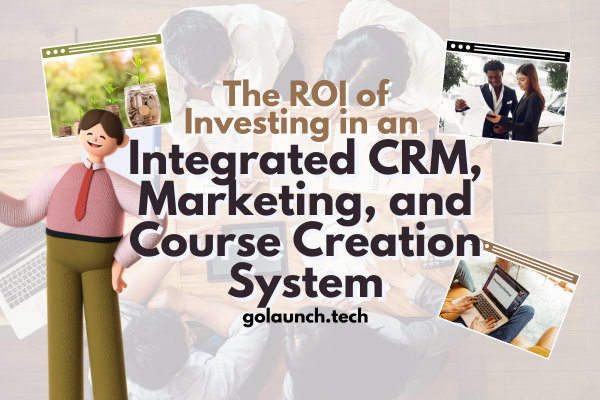In the modern business world, agility and adaptability are vital. As industries continue to evolve, so too do customer expectations. Recognizing this shift, many businesses are making a pivotal move: investing in integrated systems that combine CRM, marketing, and course creation. But is the investment worth it? Let’s delve into the tangible returns:
1. Enhanced Customer Insights:
- Benefits: An integrated CRM offers deep insights into customer behaviors, preferences, and interactions. This data-driven approach allows businesses to create personalized marketing campaigns and courses tailored to specific audiences.
- ROI: Higher conversion rates, increased customer retention, and a boost in overall customer lifetime value.
2. Streamlined Marketing Efforts:
- Benefits: With consolidated marketing tools, businesses can manage multi-channel campaigns, track performance metrics, and adjust strategies in real-time.
- ROI: Greater marketing efficiency, higher campaign ROIs, and a significant reduction in marketing overheads.
3. Rapid Course Creation & Distribution:
- Benefits: An integrated system allows for the swift development and deployment of courses, webinars, or training modules. The content can be easily marketed to targeted segments.
- ROI: Increased course enrollments, additional revenue streams, and heightened brand authority in the industry.
4. Automated Workflows & Reduced Redundancies:
- Benefits: Automation capabilities ensure routine tasks, from lead generation to customer follow-ups, are handled efficiently. This reduces manual efforts and possible errors.
- ROI: Time and cost savings, improved operational efficiency, and enhanced team productivity.
5. Cohesive Customer Journeys:
- Benefits: By integrating CRM and marketing tools, businesses can craft cohesive customer journeys, ensuring consistent touchpoints and experiences.
- ROI: Enhanced customer satisfaction, increased referral rates, and improved brand loyalty.
6. Continuous Learning & Improvement:
- Benefits: The system's analytics and feedback tools offer insights into course performance, marketing campaign efficacy, and customer preferences.
- ROI: Continuous refinement of strategies, ensuring businesses remain adaptive and competitive in their market.
7. Centralized Data Management:
- Benefits: Having a unified platform ensures all customer data, marketing metrics, and course analytics are stored centrally, reducing data fragmentation.
- ROI: Simplified decision-making, reduced data management costs, and improved data security.
Conclusion:
Investing
